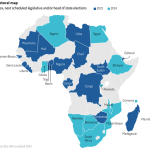Recommendation #2: The ICS Zimbabwe should contain a detailed explanation of the conditions under which it would be (and would not be) in US national security and foreign policy interests for Zimbabwe to become a growth hub for Southern Africa.
The government of Zimbabwe has strong relationships with major-power competitors of the United States and other authoritarian revisionist states who have expressed a manifest desire to change the world order.
The ICS Zimbabwe acknowledges that China has “expanded its influence” in Zimbabwe, and this is providing Beijing with “near-unfettered access to Zimbabwean natural resources,” including base minerals that are critical to the global clean-energy transition.
At the same time, the ICS declares that the Zimbabwean economy is currently functioning “for the benefit of a privileged few, including the president, his family, senior military officials, and a small group of elite ruling party and private sector actors.”
In this context, there is a need to make clear the conditions under which the transformation of Zimbabwe into a growth hub for Southern Africa would contribute “to local job creation, greater transparency, local economic development, citizen empowerment, gender equality, climate-smart solutions, and improved labour and environmental standards,” among other things.
In parallel, there is a need to identify the conditions under which the transformation of Zimbabwe into a growth hub for Southern Africa would support the administration’s policy of focusing on the transnational aspects of corruption.
One cannot assume that the transformation of the country into a regional growth hub would be of much benefit to ordinary Zimbabweans. It could very well fuel the spread of corruption and widen the already massive inequities that exist across the country.
Continued next page
(520 VIEWS)


